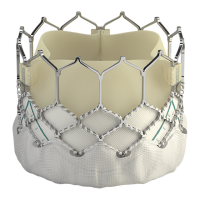17
Major Vascular Complications at 30 Days –
SAPIEN 3 Valve vs. SAPIEN Valve (VI Population)
Table 10:
Major Vascular Complications at 30 Days –
SAPIEN 3 Valve vs. SAPIEN Valve (VI Population)
Event at 30 Day
SAPIEN 3
Valve
(N = 583)
SAPIEN
Valve
(N = 326)
Proportion
Difference in
Average T
Effect on the
P-value
Complications, n/Total no.
(5.0%)
(10.1%)
1
-8.0%
[-16.2%, 0.3%]
2
0.0578
1
95% Clopper-Pearson Exact confidence interval.
2
The Wald-type two-sided 90% confidence interval using weighted mean and SD is provided.
Table 11 lists the hypothesis testing of the two secondary endpoints conducted with p-values in
descending order for the Hochberg multiplicity adjustment steps. The largest p-value (p=0.0578 from
major vascular complications) was greater than 0.05. As such, the null hypothesis was not rejected for the
testing of major vascular complications at 30 days. The subsequent testing of AI ≥ moderate at 30 days
had a p-value of 0.0051, which was less than 0.025. As such, the null hypothesis was rejected for
AI ≥ moderate at 30 days, indicating that the SAPIEN 3 cohort was superior over the SAPIEN cohort in
regards to AI ≥ moderate at 30 days.

